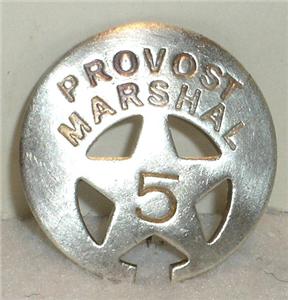
Provost Duty The Provost Marshall’s office was developed under the command of General McClellan during the early part of the war. This development created the Provost Marshall General, and the newly charged special department whose duties and definition of this office was for the first time under one management department head. The duties of a Provost Marshall are among the following listed: The suppression of marauding and depredation on private property The preservation of good order The prevention of straggling The suppression of gambling houses or other establishments prejudicial to good order and discipline Supervision of hotels, saloons and places of resort and amusements generally The Provost Marshall par took the character both of a Chief of Police and Magistrate. Among the duties of this officer he was entrusted with the duty of making searches, seizures and arrest. He had the custody of deserters, and of deserters from the opposing forces and of prisoners of war. All prisoners taken in battle were turned over to the Provost Marshall and by him later transferred to special guards, who delivered the prisoners to prison camps farther North. He also had jurisdiction over the issuance of passes into camps to citizens as well as to hearing complaints lodged by citizens. Among his contact with the citizens was the supervision of the draft. He, also, saw that order was preserved, and that arrest were made against all offenders against military discipline under his authority, in short, preserving Marshall Law among the citizens. All arrest made, the Provost Marshall was responsible for their safe keeping. The Provost Marshall took an active role in the suppression of anti-union organizations that populated the Border States. Some of these Secret Societies were; The Knights of the Golden Circle, The Order of American Knights (O.A.K.), the Corps de Belgique, and many smaller groups under different names. At a point during the war many of these groups consolidated into the organization called "Sons of Liberty". Although this organization was made up of many smaller groups, some of these groups retained their original names were retained in their secular areas. These organizations operated in the following areas; Ohio, Indiana, Illinois, Kentucky, and Missouri, These groups did as much as they could to disrupt the war on the home front, such as, actively discouraging enlistment and authorizing draft resistance. Arrest made early in the war against people in these organizations included charges of guilt for ".Publicly expressing sympathies for those in arms against the Government of the United States" and "declaring disloyal sentiments."
|